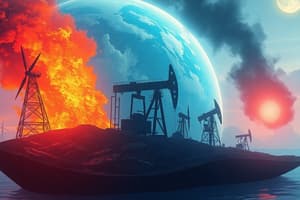Podcast
Questions and Answers
What is the primary consequence of burning fossil fuels on the environment?
What is the primary consequence of burning fossil fuels on the environment?
Releasing greenhouse gases into the atmosphere, contributing to global warming.
What is the predicted outcome of rising global temperatures due to climate change?
What is the predicted outcome of rising global temperatures due to climate change?
Sea levels will rise, and extreme weather conditions like floods, heat waves, and droughts will occur more often.
What are the negative effects of air pollution on human health?
What are the negative effects of air pollution on human health?
Air pollution contributes to diseases like asthma.
What are the benefits of renewable energy sources like wind, solar, and biomass?
What are the benefits of renewable energy sources like wind, solar, and biomass?
What is the significance of renewable energy in agriculture?
What is the significance of renewable energy in agriculture?
Why is India well-suited for renewable energy production?
Why is India well-suited for renewable energy production?
What is the trend in the cost of renewable energy technologies?
What is the trend in the cost of renewable energy technologies?
What is the main advantage of replacing petroleum with fuels made from plant matter?
What is the main advantage of replacing petroleum with fuels made from plant matter?
What is the primary classification of energy sources?
What is the primary classification of energy sources?
Why is energy independence important for a country?
Why is energy independence important for a country?
Flashcards are hidden until you start studying
Study Notes
Energy Scenario in India
- India is the sixth largest energy consumer in the world.
- The country's energy consumption is expected to increase in the near future.
- Fossil fuels are the largest energy source, providing around 76% of India's electricity.
- Hydroelectric power accounts for 22% of India's electricity, while nuclear power accounts for 2%.
- India's total energy consumption has increased approximately fourfold over the last three decades.
Coal in India
- India is the world's third largest coal producer, ranking behind the United States and China.
- Domestic production of coal meets approximately 95% of domestic demand.
- Coal consumption is expected to increase by 28% by 2010.
Oil in India
- Oil provides roughly 30% of India's energy.
- Domestic production of oil provides for only a third of India's oil demand.
- By 2010, roughly 75% of India's oil and gas needs will be met by imports.
- The government predicts that India will deplete its oil reserves by 2012.
Renewable Energy
- Renewable energy sources, such as wind, solar, small hydro, and biomass, are receiving increased attention.
- Replacing fossil fuels with fuels made from plant matter could save money and strengthen energy security.
- Renewable energy is plentiful, and the technologies are improving all the time.
- Renewable energy provides long-term sustainable development not only in agriculture but also in all other sectors.
Tidal Energy
- Tidal energy harnesses the power of ocean tides to generate electricity.
- This is done by constructing a barrage (barrier) across the sea to create a basin for storing water.
- During high tide, water flows from the sea to the tidal basin through a turbine, producing electricity.
- During low tide, water flows from the tidal basin to the sea through a turbine, again producing electricity.
Non-Renewable Natural Resources
- Non-renewable energy sources are those that will eventually run out.
- There are four major types of non-renewable resources: oil, natural gas, coal, and nuclear energy.
- Oil, natural gas, and coal are collectively called fossil fuels.
Oil Energy
- Crude oil is referred to as Liquid Petroleum and is used for gasoline, heating oil, and diesel fuel.
- Burning fossil fuels sends greenhouse gases into the atmosphere, trapping the sun's heat and contributing to global warming.
- Pollutants released into the air, soil, and water when fossil fuels are burned harm the environment and humans.
Studying That Suits You
Use AI to generate personalized quizzes and flashcards to suit your learning preferences.




